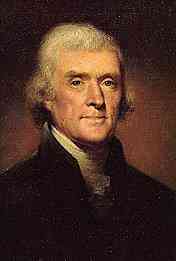
To Charles Thomson Monticello, January 9, 1816MY DEAR AND ANCIENT FRIEND,-- An acquaintance of fifty-two years, for I think ours dates from 1764, calls for an interchange of notice now and then, that we remain in existence, the monuments of another age, and examples of a friendship unaffected by the jarring elements by which we have been surrounded, of revolutions of government, of party and of opinion. I am reminded of this duty by the receipt, through our friend Dr. Patterson, of your synopsis of the four Evangelists. I had procured it as soon as I saw it advertised, and had become familiar with its use; but this copy is the more valued as it comes from your hand. This work bears the stamp of that accuracy which marks everything from you, and will be useful to those who, not taking things on trust, recur for themselves to the fountain of pure morals. I, too, have made a wee-little book from the same materials, which I call the Philosophy of Jesus; it is a paradigma of his doctrines, made by cutting the texts out of the book, and arranging them on the pages of a blank book, in a certain order of time or subject. A more beautiful or precious morsel of ethics I have never seen; it is a document in proof that I am a real Christian, that is to say, a disciple of the doctrines of Jesus, very different from the Platonists, who call me infidel and themselves Christians and preachers of the gospel, while they draw all their characteristic dogmas from what its author never said nor saw. They have compounded from the heathen mysteries a system beyond the comprehension of man, of which the great reformer of the vicious ethics and deism of the Jews, were he to return on earth, would not recognize one feature. If I had time I would add to my little book the Greek, Latin and French texts, in columns side by side. And I wish I could subjoin a translation of Gosindi's Syntagma of the doctrines of Epicurus, which, notwithstanding the calumnies of the Stoics and caricatures of Cicero, is the most rational system remaining of the philosophy of the ancients, as frugal of vicious indulgence, and fruitful of virtue as the hyperbolical extravagances of his rival sects. I retain good health, am rather feeble to walk much, but ride with ease, passing two or three hours a day on horseback, and every three or four months taking in a carriage a journey of ninety miles to a distant possession, where I pass a good deal of my time. My eyes need the aid of glasses by night, and with small print in the day also; my hearing is not quite so sensible as it used to be; no tooth shaking yet, but shivering and shrinking in body from the cold we now experience, my thermometer having been as low as 12 degrees this morning. My greatest oppression is a correspondence afflictingly laborious, the extent of which I have been long endeavoring to curtail. This keeps me at the drudgery of the writing-table all the prime hours of the day, leaving for the gratification of my appetite for reading, only what I can steal from the hours of sleep. Could I reduce this epistolary corvee within the limits of my friends and affairs, and give the time redeemed from it to reading and reflection, to history, ethics, mathematics, my life would be as happy as the infirmities of age would admit, and I should look on its consummation with the composure of one "qui summum nec me tuit diem nec optat." So much as to myself, and I have given you this string of egotisms in the hope of drawing a similar one from yourself. I have heard from others that you retain your health, a good degree of activity, and all the vivacity and cheerfulness of your mind, but I wish to learn it more minutely from yourself. How has time affected your health and spirits? What are your amusements, literary and social? Tell me everything about yourself, because all will be
interesting to me who retains for you ever the same constant and
affectionate friendship and respect. |
